Recent publications
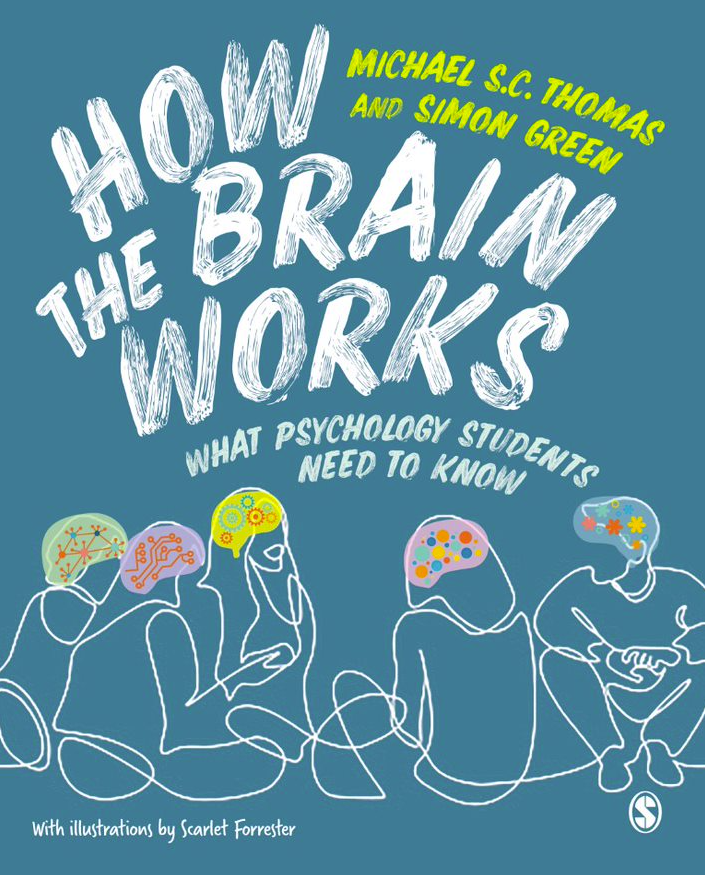 |
Thomas, M. S. C. & Green, S. (2023). How the brain works: What psychology students need to know. London: Sage Publishing. |
Farran, E. K., Purser, H. R. M., Jarrold, C., Thomas, M. S. C., Scerif, G., Stojanovik, V., Van Herwegen, J. (2023). Cross-sectional and longitudinal assessment of cognitive development in Williams syndrome. Dev Sci. 2023 Jun 7:e13421. doi: 10.1111/desc.13421. Epub ahead of print. PMID: 37287370.
Murray, A., Gough, G., Cindrić, A., Vučković, F., …, Thomas, M. S. C, …, & Nižetić, D. [46 authors] (2023). Dose imbalance of DYRK1A kinase causes systemic progeroid status in Down syndrome by increasing the un-repaired DNA damage and reducing LaminB1 levels. eBioMedicine, Online First, 104692, Published: July 12, 2023. https://doi.org/10.1016/j.ebiom.2023.104692
Rogers, C. J., Tolmie, A., Massonnié, J, & Thomas, M. S. C. (2023) Complex cognition and individual variability: a mixed methods study of the relationship between creativity and executive control. Front. Psychol. 14:1191893. doi: 10.3389/fpsyg.2023.1191893
Kirkman, M. A., Ekert, J. O., Hunn, B. H. M., Thomas, M. S. C., Tolmie, A. K. (2023). A systematic review of cognitive interventions for adult patients with brain tumours. Cancer Med. 2023 May;12(10):11191-11210. doi: 10.1002/cam4.5760. Epub 2023 Mar 7. PMID: 36880363; PMCID: PMC10242361.
Thomas, M. S. C., & Coecke, S. (2023). Associations between socioeconomic status, cognition and brain structure: Evaluating potential causal pathways through mechanistic models of development. Cognitive Science, Volume 47, Issue 1, e13217. First published: 06 January 2023. https://doi.org/10.1111/cogs.13217
Thomas, M. S. C., & McClelland, J. L. (2023). Connectionist Models of Cognition. In: R. Sun (Ed.) The Cambridge Handbook of Computational Cognitive Sciences (pp. 29-79). Cambridge University Press. doi: 10.1017/9781108755610. Uncorrected proof.
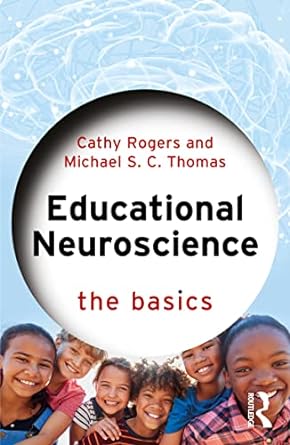 |
Rogers, C., & Thomas, M. S. C. (2022). Educational Neuroscience – The Basics. London, UK: Psychology Press. |
Kirkman, M. A., Hunn, B. H. M., Thomas, M. S. C., & Tolmie, A. K. (2022). Influences on cognitive outcomes in adult patients with gliomas: a systematic review. Frontiers in Oncology: Neuro-Oncology and Neurosurgical Oncology. 05 August 2022 DOI 10.3389/fonc.2022.943600
Filippi, R., Ceccolini, A., Booth, E., Shen, C., Thomas, M. S. C., Toledano, M. B., & Dumontheil, I. (2022). Modulatory effects of SES and multilinguistic experience on cognitive development: a longitudinal data analysis of multilingual and monolingual adolescents from the SCAMP cohort. International Journal of Bilingual Education and Bilingualism, 25:9, 3489-3506, DOI: 10.1080/13670050.2022.2064191
Yang, J., Sun, B., Kuang, X., & Thomas, M. S. C. (2022). Enhancing the auditory usage of L2 e-storybooks by precedingly providing learners with perceptual intervention. Interactive Learning Environments, DOI: 10.1080/10494820.2022.2067185
C Stamate, GD Magoulas, MSC Thomas, BASIS Team. (2021). Deep Learning Topology–Preserving EEG–Based Images for Autism Detection in Infants. International Conference on Engineering Applications of Neural Networks, 71-82
S Gini, V Knowland, MSC Thomas, J Van Herwegen (2021). Neuromyths about neurodevelopmental disorders: misconceptions by educators and the general public. Mind, Brain, and Education 15 (4), 289-298. https://doi.org/10.1111/mbe.12303
Hodgkiss A, Gilligan-Lee KA, Thomas MSC, Tolmie AK, Farran EK. The developmental trajectories of spatial skills in middle childhood. Br J Dev Psychol. 2021 Nov;39(4):566-583. doi: 10.1111/bjdp.12380.
Shen, C., Dumontheil, I., Thomas, M. S. C., Röösli, M., Elliott, P., & Toledano, M. (2021). Digital Technology Use and Body Mass Index: Evidence from Cross-sectional Analysis of an Adolescent Cohort Study. Journal of Medical Internet Research, 23 (7), e26485. http://dx.doi.org/10.2196/26485
Purser, H. R. M., Van Herwegen, J., Ranzato, E., & Thomas, M. S. C. (2021). The role of context in verbal humor processing in autism. Journal of Experimental Child Psychology, 209, 105166. https://doi.org/10.1016/j.jecp.2021.105166.
Gilligan-Lee, K. A., Hodgkiss, A., Thomas, M. S. C., Patela, P. K., & Farran, E. K. (2021). Aged-based differences in spatial language skills from 6 to 10 years: Relations with spatial and mathematics skills. Learning and Instruction, 73, 101417. https://doi.org/10.1016/j.learninstruc.2020.101417
Thomas, M. S. C., & Brady, D., (2021). Quo vadis modularity in the 2020s? In M. S. C. Thomas, D. Mareschal, & V. C. P. Knowland (Eds.). Taking development seriously: Neuroconstructivism and the multi-disciplinary approach to understanding the emergence of mind. A Festschrift for Annette Karmiloff-Smith (p. 159-174). London, UK: Psychology Press.
D’Souza, H., Brady, D., Wiseman, F. K., Good, M. A., Thomas, M. S. C., and The LonDownS Consortium (2021). Aligning cognitive studies in mouse models and human infants/todlers: The case of Down syndrome. In M. S. C. Thomas, D. Mareschal, & V. C. P. Knowland (Eds.). Taking development seriously: Neuroconstructivism and the multi-disciplinary approach to understanding the emergence of mind. A Festschrift for Annette Karmiloff-Smith (p. 213-238). London, UK: Psychology Press.
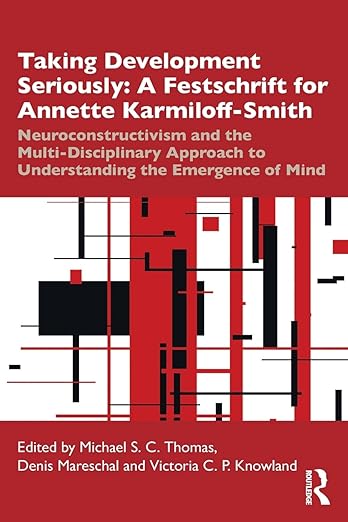 |
Thomas, M. S. C., Mareschal, D., & Knowland, V. C. P. (2021). Taking development seriously: Neuroconstructivism and the multi-disciplinary approach to understanding the emergence of mind. A Festschrift for Annette Karmiloff-Smith. London, UK: Psychology Press. |
Whiting, S. B., Wass, S. V., Green, S., & Thomas, M. S. C. (2021). Stress and learning in pupils: Neuroscience evidence and its relevance for teachers. Mind Brain and Education, 15(2), 177-188. https://doi.org/10.1111/mbe.12282
Best, W., Hughes, L., Masterson, J., Thomas, M. S. C., Howard, D., Kapikian, A. & Shobbrook, K. (2021). Understanding differing outcomes from semantic and phonological interventions with children with word-finding difficulties: a group and case series study. Cortex, 134, 145-161. https://doi.org/10.1016/j.cortex.2020.09.030
D’Souza H, Mason L, Mok KY, et al. Differential associations of Apolipoprotein E ε4 genotype with attentional abilities across the life span of individuals with Down Syndrome. JAMA Netw Open. 2020;3(9):e2018221. doi:10.1001/jamanetworkopen.2020.18221
Thomas, M. S. C., Ojinaga Alfageme, O., D’Souza, H., Patkee, P. A., Rutherford, M. A., Mok, K. Y., Hardy, J., the LonDownS Consortium & Karmiloff-Smith, A. (2020). A multi-level developmental approach to exploring individual differences in Down syndrome: genes, brain, behaviour, and environment. Research in Developmental Disorders, 104, 103638. https://doi.org/10.1016/j.ridd.2020.103638
Thomas, M. S. C. (2020). Foreword. In: Harrington, J., Beale, J., Fancourt, A., & Lutz, C. (2020). The ‘BrainCanDo’ Handbook of Teaching and Learning: Practical Strategies to Bring Psychology and Neuroscience into the Classroom (p. 1-6). London, UK: Routledge. Pdf
Thomas, M. S. C. & Rogers, C. (2020). Education, the science of learning, and the COVID-19 crisis. Prospects (UNESCO comparative journal of curriculum, learning, and assessment). Published online 25 May 2020. doi: 10.1007/s11125-020-09468-z. Pdf.
Glennon, J. M., D’Souza, H., Mason, L., Karmiloff-Smith, A., & Thomas, M. S. C. (2020). Visuo-attentional correlates of Autism Spectrum Disorder (ASD) in children with Down syndrome: A comparative study with children with idiopathic ASD. Research in Developmental Disorders, 104, 103678. https://doi.org/10.1016/j.ridd.2020.103678
Knowland, V. C. P., & Thomas, M. S. C. (2020). Neuro-Myths in the Classroom. Front. Young Minds. 8:49. doi: 10.3389/frym.2020.00049.
Startin, C. M., D’Souza, H., Ball, G., Hamburg, S., Hithersay, R., Hughes, K. M. O., Massand, E., Karmiloff-Smith, A., Thomas, M. S. C., LonDownS Consortium, & Strydom, A. (2020). Health comorbidities and cognitive abilities across the lifespan in Down syndrome. Journal of Neurodevelopmental Disorders, 12(1): 4. doi: 10.1186/s11689-019-9306-9.
Thomas, M. S.C., Knowland, V. C.P., & Rogers, C. (2020). The Science of Adult Literacy. Social Protection and Jobs Discussion Paper, No. 2001. World Bank, Washington, DC. © World Bank. https://openknowledge.worldbank.org/handle/10986/33278. License: CC BY 3.0 IGO. TKR-The-Science-of-Adult-Literacy-2020.
Jenkins, R. H., Shen, C., Dumontheil, I., Thomas, M. S. C., Elliott, P., Rööslie, M., & Toledano, M. B. (2020). Social networking site use in young adolescents: Association with health-related quality of life and behavioural difficulties. Computers in Human Behavior, 109, 106320. https://doi.org/10.1016/j.chb.2020.106320
Wilkinson, H. R., Smid, C., Morris, S., Farran, E. K., Dumontheil, I., Mayer, S., Tolmie, A., Bell, D., Porayska-Pomsta, K., Holmes, W., Mareschal, D., Thomas, M. S. C., & The UnLocke Team (2020). Domain-Specific Inhibitory Control Training to Improve Children’s Learning of Counterintuitive Concepts in Mathematics and Science. Journal of Cognitive Enhancement, 4, 296–314. Published online 12 December 2019. https://doi.org/10.1007/s41465-019-00161-4
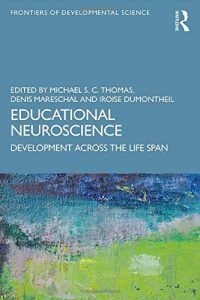 |
Thomas, M. S. C., Mareschal, D., & Dumontheil, I. (2020). Educational Neuroscience: Development Across the Lifespan. London, UK: Psychology Press. |
Thomas, M. S. C., Dumontheil, I., & Mareschal, D. (2020). Key challenges in advancing educational neuroscience. In M. S. C. Thomas, D. Mareschal & I. Dumontheil (Eds.), Educational Neuroscience: Development Across the Lifespan. London, UK: Psychology Press. Pdf.
Thomas, M. S. C. (2020). Developmental disorders: Struggling at school? The unbiased eye sees few specific disorders, no specific brain regions. Current Biology, 30, R304-R306. https://doi.org/10.1016/j.cub.2020.02.019.
Thomas, M. S. C., & Porayska-Pomsta, K. (2020). Computational methods in education: Neurocomputational models of cognition versus technology as a tool for supporting learning and teaching. To appear in: Houdé, O. & Borst, G. (Eds.), The Cambridge handbook of cognitive development, Volume 3: Education and school-learning domains. Cambridge, UK: Cambridge University Press. Pdf.
Kohli, M., Magoulas, G. D., & Thomas, M. S. C. (2020). Evolving connectionist models to capture population variability across language development: Modelling children’s past tense formation. Artificial Life, 26, 217–241. https://doi.org/10.1162/artl_a_00316. Pdf.
Pursuer, H. R. M., van Herwegen, J., & Thomas, M. S. C. (2020). The development of children’s comprehension and appreciation of riddles. Journal of Experimental Child Psychology, 189, 104709. https://doi.org/10.1016/j.jecp.2019.104709
Thomas, M. S. C., Fedor, A., Davis, R., Yang, J., Alireza, H., Charman, T., Masterson, J., & Best, W. (2019). Computational modelling of interventions for developmental disorders. Psychological Review, 26(5), 693-726. doi: 10.1037/rev0000151. Pdf.
Dündar-Coecke, S., & Thomas, M. S. C. (2019). Modeling socioeconomic effects on the development of brain and behavior. In A.K. Goel, C.M. Seifert, & C. Freksa (Eds.), Proceedings of the 41st Annual Conference of the Cognitive Science Society (pp. 1676-82). Montreal, QB: Cognitive Science Society. Pdf.
Thomas, M. S. C. (2019). Response to Dougherty & Robey on neuroscience and education: Enough bridge metaphors – interdisciplinary research offers the best hope for progress. Current Directions in Psychological Science. Pdf.
Van Herwegen, J., Purser, H., Thomas, M. S. C., & the WiSDom team. (2019). Studying Development in Williams Syndrome: Progress, Prospects, and Challenges. Advances in Neurodevelopmental Disorders. Published online 12 April 2019. https://doi.org/10.1007/s41252-019-00109-x. Pdf.
Mireku, M. O., Barker, M. M., Mutz, J., Dumontheil, I., Thomas, M. S. C., Röösli, M., Elliott, P., & Toledano, M. B. (2019). Night-time screen-based media device use and adolescents’ sleep and health-related quality of life. Environment International, 124:66-78. doi: 10.1016/j.envint.2018.11.069. Final draft.
Green, C. S., Bavelier, D., … Thomas, M. S. C., et al. [48 authors] (2019). Improving methodological standards in behavioral interventions for cognitive enhancement. Journal of Cognitive Enhancement. Green_etal_ConsensusMethods_accepted
Thomas, M. S. C. (2019). Using neurocomputational modelling to investigate mechanisms underlying socio-economic status effects on cognitive and brain development. In: Lipina, S.J., & Segretin, M.S. (Eds.) (2019). Exploraciones neurocientíficas de la pobreza [Neuroscientific explorations of poverty] (p. 255-288). Erice, Italy: International Mind, Brain and Education School (Ettore Majorana Foundation for Scientific Culture). ISBN 978-987-86-2055-8. Final draft.
Yang, J. Thomas, M. S. C., Qi, X., &Liu, X. (2019). Using an ANN based computational model to simulate and evaluate Chinese students’ individualized cognitive abilities important to their English acquisition. Computer Assisted Language Learning. Final draft.
Richardson, F. & Thomas, M. S. C. (2019). Neuroconstructivism. In J. S. Damico & M. J. Ball (Eds.), The SAGE Encyclopedia of Human Communication Sciences and Disorders. London: Sage Publications Ltd. PDF of final draft.
Gilligan, K. A., Hodgkiss, A., Thomas, M. S. C., & Farran, E. K. (2018). The developmental relations between spatial cognition and mathematics in primary school children. Developmental Science. Epub 13 December 2018 https://doi.org/10.1111/desc.12786. Gilligan et al 2018 final draft, Gilligan et al 2018 final tables 4-9
Hodgkiss, A., Gilligan, K. A., Tolmie, A. K., Thomas, M. S. C., & Farran, E. K. (2018). Spatial cognition and science achievement: The contribution of intrinsic and extrinsic spatial skills from 7 to 11 years. British Journal of Educational Psychology, 88, 4, 675-697. https://doi.org/10.1111/bjep.12211. Final draft.
Yang, J., Thomas, M. S. C., & Liu, H. (2019). Rule extraction from autoencoder-based connectionist computational models. Concurrency and Computation: Practice and Experience, Special Issue: Semantics, knowledge, and grids at the age of big data and AI (SKG2016), 31(3), 10 February 2019; https://doi.org/10.1002/cpe.4262. Yang_etal_2017
Thomas, M.S.C, Ansari, D., & Knowland, V.C.P. (2018). Annual Research Review: Educational neuroscience: progress and prospects. Journal of Child Psychology and Psychiatry. doi: 10.1111/jcpp.12973. [Epub ahead of print]. PDF
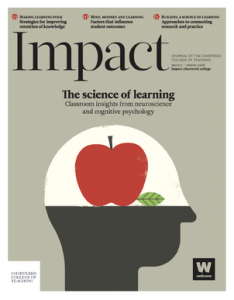 |
Brookman-Bryne, A. & Thomas, M. S. C. (2018). Neuroscience, psychology and education: Emerging links. Impact Magazine. Issue 2, Spring 2018. PDF |
Toledano, M. B., Mutz, J., Röösli, M., Thomas, M. S. C., Dumontheil, I., & Elliott, P. (2018). Cohort profile: Study of Cognition, Adolescents, and Mobile Phones (SCAMP). International Journal of Epidemiology, 1-14. PDF
Gilligan, K. A., Hodgkiss, A., Thomas, M. S. C., & Farran, E. K. (2018). The use of discrimination scaling tasks: A novel perspective on the development of spatial scaling in children. Cognitive Development, 47, 133-145. PDF
Thomas, M. S. C. (2018). A neurocomputational model of developmental trajectories of gifted children under a polygenic model: When are gifted children held back by poor environments? Intelligence, 69, 200-212. PDF
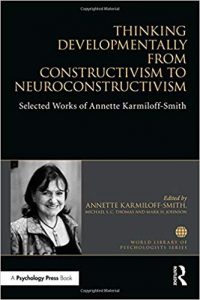 |
Karmiloff-Smith, A., Thomas, M. S. C., & Johnson, M. H. (2018). Thinking Developmentally from Constructivism to Neuroconstructivism: Selected Works of Annette Karmiloff-Smith. London, UK: Routledge. Final draft of AKS_ThinkingDevelopmentally_CH1, giving an overview of the evolution of Annette’s ideas. |
Alireza, H., Fedor, A., & Thomas, M. S. C. (2017). Simulating behavioural interventions for developmental deficits: When improving strengths produces better outcomes than remediating weaknesses. In G. Gunzelmann, A. Howes, T. Tenbrink & E. Davelaar (Eds.), Proceedings of the 39th Annual Meeting of the Cognitive Science Society, London, UK, 26-29 July 2017. Pdf.
Glennon, J. M., Karmiloff-Smith, A., & Thomas, M. S. C. (2017). Syndromic autism: Progressing beyond current levels of description. Review Journal of Autism and Developmental Disorders, Published on-line 17 August 2017.doi. Pdf of final draft.
Yang, J., Thomas, M. S. C., & Liu, H. (2017). Rule extraction from autoencoder-based connectionist computational models. Concurrency and Computation: Practice and Experience,
2017;e4262. doi Pdf.
Best, W., Hughes, L. M., Masterson, J., Thomas, M. S. C., Fedor, A., Roncoli, S., Fern-Pollack, L., Shepherd, D. L., Howard, D., Shobbrook, K., & Kapikian, A. (2017). Intervention for children with word-finding difficulties: a parallel group randomised control trial. International Journal of Speech Language Pathology, Jul 31:1-12. doi. [Epub ahead of print]
Thomas, M. S. C. (2017). A scientific strategy for life chances. The Psychologist, May 2017, Vol.30, 22-26. Pdf.
Kerrigan, L., Thomas, M. S. C., Bright, P., & Filippi, R. (2017). Evidence of an advantage in visuo-spatial memory for bilingual compared to monolingual speakers. Bilingualism: Language and Cognition. Volume 20, Issue 3 May 2017, pp. 602-612. doi: 10.1017/S1366728915000917, Pdf.
Mireku, M. O., Mueller, W., Fleming, C., Chang, I., Dumontheil, I., Thomas, M. S. C., Eeftense, M., Elliott, P., Röösli, M., & Toledano, M. B. (2017). Total recall in the SCAMP Cohort: Validation of self-reported mobile phone use in the smartphone era. Environmental Research. 2017 Oct 30;161:1-8. doi. [Epub ahead of print]. Pdf of final draft.
Thomas, M. S. C. (2016). Do more intelligent brains retain heightened plasticity for longer in development? A computational investigation. Developmental Cognitive Neuroscience, 19, 258-269. Science Direct. Thomas_2016_supplementary_material.
Camp, J. S., Karmiloff-Smith, A., Thomas, M. S. C., & Farran, E. K. (2016). Cross-syndrome comparison of real-world executive functioning and problem solving using a new problem-solving questionnaire. Research in Developmental Disabilities. 2016 Dec;59:80-92. DOI. Epub 2016 Aug 10. Click here for final draft.
Howard-Jones, P., Varma, S., Ansari, D., Butterworth, B., De Smedt, B., Goswami, U., Laurillard, D., & Thomas, M. S. C. (2016). The principles and practices of educational neuroscience: Commentary on Bowers. Psychological Review, Oct;123(5):620-627. doi. PDF of final draft.
Baughman, F. D., Thomas, M. S. C., Anderson, M., & Reid, C. (2016). Common mechanisms in intelligence and development: A study of ability profiles in mental age-matched primary school children. Intelligence, 56, 99-107, doi: 10.1016/j.intell.2016.01.010, PDF.
Thomas, M. S. C., Davis, R., Karmiloff-Smith, A., Knowland, V. C. P., & Charman, T. (2016). The over-pruning hypothesis of autism. Developmental Science., 19(2), 284-305. doi: 10.1111/desc.12303. Click here for PDF version.
Thomas, M. S. C. (2016). Understanding delay in developmental disorders. Child Development Perspectives, 10(2), 73-80. June 2016. Article first published online: 5 FEB 2016. DOI: 10.1111/cdep.12169, PDF.
Forrester, G. S. & Thomas, M. S. C. (2015). What is universal and what differs in language development? Language, Cognition and Neuroscience, DOI: 10.1080/23273798.2015.1055281. Click here for pdf version.
Karaminis, T. & Thomas, M. S. C. (2015). The relationship between SLI in English and Modern Greek: Insights from computational models of language acquisition.
In: S. Stavrakaki (Ed.) Current Trends in Research on Specific language Impairment (pp. 145-173). John Benjamins. Click here for pdf version.
Richardson, F., & Thomas, M. S. C. (2015). Language Development in Genetic Disorders. In E. Bavin & L. Naigles (Eds.) CUP Handbook of Child Language 2nd edition (pp. 585-608).
Cambridge University Press. ISBN-13: 978-1107087323 Click here for pdf version.
Yang, J. & Thomas, M. S. C. (2015). Simulating intervention to support compensatory strategies in an artificial neural network model of atypical language development.
In G. Airenti and M. Cruciani (Eds.), Proceedings of EuroAsianPacific Joint Conference on Cognitive Science, Torino, Italy, September 25-27th, 2015. Click here for pdf version.
Stamate, C., Magoulas, G. D., & Thomas, M. S. C. (2015). Transfer learning approach for financial applications. In R. Everson, E. Keedwell & D. Walker (Eds.),
Proceedings of the UK Workshop on Computational Intelligence, University of Exeter 7th – 9th September 2015. Click here for pdf version.
Thomas, M. S. C., Kovas, Y., Meaburn, E., & Tolmie, A. (2015). What can the study of genetics offer to educators? Mind, Brain & Education, 9(2), 72-80. Click here for pdf version.
Thomas, M. S. C., Forrester, N. A., & Ronald, A. (2015). Multi-scale modeling of gene-behavior associations in an artificial neural network model of cognitive development. Cognitive Science, Volume 40, Issue1. January 2016, Pages 51-99. First published online: 3 APR 2015. DOI: 10.1111/cogs.12230. Click here for pdf version and here for Supplementary Material (1.7mb)
Best, W., Fedor, A., Hughes, L., Kapikian, A., Masterson, J., Roncoli, S., Fern-Pollak, L., & Thomas, M. S. C. (2015). Intervening to alleviate word-finding difficulties in children: Case series data and a neurocomputational foundation. Cognitive Neuropsychology, 32:3-4, 133-168, DOI:10.1080/02643294.2014.1003204. Click here for pdf version.
Knowland, V. C. P., Purser, H. & Thomas, M. S. C. (2015). Applications of cross-sectional methodologies in developmental psychology. In J. Wright (Ed.), International Encyclopedia of Social and Behavioral Sciences (2nd Edition). (pp. 354-360). Oxford: Elsevier. ISBN-10: 0080970869. ISBN-13: 978-0080970868. Click here for pdf version.
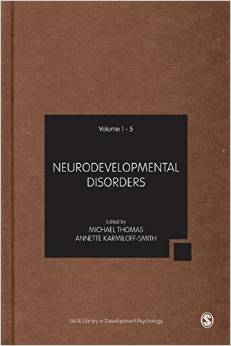 |
Thomas, M. S. C. & Karmiloff-Smith, A. (2014). Neurodevelopmental Disorders (SAGE Library in Developmental Psychology). |
Forrester, G. S., Pegler, R., Thomas, M. S. C., & Mareschal, D. (2014). Handedness as a marker of cerebral lateralisation in children with and without autistic spectrum disorder.
Behavioural Brain Research, 268, 14-21. DOI:10.1016/j.bbr.2014.03.040 Click here for PDF version (618k)
Thomas, M. S. C., & Baughman, F. D. (2014). Neuroconstructivisme: pour comprendre les trajectoires developpementales typiques et atypiques (Neuroconstructivism: Understanding typical and atypical trajectories of development). Enfance, volume 2014, issue 03, pp. 205-236. DOI:10.4074/S0013754514003036 Click here for PDF version (1.1mb)
and for an English version (1.9mb)
Dimitriou, D., Leonard, H., Karmiloff-Smith, A., Johnson, M. H., & Thomas, M. S. C. (2014). The development of configural face recognition in children with autism, Down syndrome, and Williams syndrome. Journal of Intellectual Disability Research. Published online: 25 Jul 2014. DOI:10.1111/jir.12141. PMID: 25059077 Click here for PDF version (963k)
Knowland, V. C. P., & Thomas, M. S. C. (2014). Educating the adult brain: How the neuroscience of learning can inform educational policy. International Review of Education, 60, 99-122. DOI:10.1007/s11159-014-9412-6 Click here for PDF version (258k)
Thomas, M. S. C. & Knowland, V. C. P. (2014). Modelling mechanisms of persisting and resolving delay in language development. Journal of Speech, Language, and Hearing Research, 57(2), 467-483. DOI:10.1044/2013_JSLHR-L-12-0254. PMID: 24129016 Click here for PDF version (434k)
Karmiloff-Smith, A., Casey, B. J., Massand, E., Tomalski, P. & Thomas, M. S. C. (2014). Environmental and genetic influences on neurocognitive development: the importance of multiple methodologies and time-dependent intervention. Clinical Psychological Science, 2(5), 628-637. doi: 10.1177/2167702614521188. Click here for PDF version (381k)
Filippi, R., Karaminis, T., & Thomas, M. S. C. (2014). Language switching in bilingual production: Empirical data and computational modelling. Bilingualism: Language and Cognition, 17(2), 294-315. doi:10.1017/S1366728913000485. Click here for PDF of uncorrected proof (1.2mb)
Filippi, R., Morris, J., Richardson, F. M., Bright, P., Thomas, M. S. C., Karmiloff-Smith, A., & Marian, V. (2014). Bilingual children show an advantage in controlling verbal interference during spoken language comprehension.
Bilingualism: Language and Cognition. doi:10.1017/S1366728914000686. Click here for PDF version (360k)
Thomas, M. S. C., & van Herwegen, J. (2014). Williams Syndrome and language development. In P. Brooks, V. Kempe, & J. G. Golson (Eds.), Encyclopaedia of Language Development. Sage Publishers. Click here for PDF version (66k)
Thomas, M. S. C., & Laurillard, D. (2014). Computational modelling of learning and teaching. In: D. Mareschal, A. Tolmie & B. Butterworth, Handbook of Educational Neuroscience, (p. 46-76). Oxford: Blackwell-Wiley.
Click here for PDF version (4.6mb)
Thomas, M. S. C., Ronald, A., & Forrester, N. A. (2013). Modeling socio-economic status effects on language development. Developmental Psychology, 49 (12), 2325-43. DOI:/10.1037/a0032301.
Click here for PDF version (2.1mb).
Thomas, M. S. C. (2013). Educational neuroscience in the near and far future: Predictions from the analogy with the history of medicine. Trends in Neuroscience and Education, 2, 23-26. Click here for PDF version (434k)
Thomas, M. S. C. (2013). On hermit crabs and humans. Developmental Science, 16(2), 314-316. Click here for PDF version (90k)
Forrester, G. S., Quaresmini, C., Leavens, D. A., Mareschal, D., & Thomas, M. S. C. (2013). Human handedness: An inherited evolutionary trait. Behavioural Brain Research, 237, 200-206. Click here for PDF version (553k)
Thomas, M. S. C., Purser, H. R. M., & Richardson, F. M. (2013). Modularity and developmental disorders. In: P. D. Zelazo (Ed), Oxford Handbook of Developmental Psychology. Oxford: Oxford University Press.
Click here for PDF of uncorrected proof (283K)
Kohli, M., Magoulas, G. D., & Thomas, M. S. C. (2013). Transfer learning across heterogeneous tasks using behavioural genetic principles. In Y. Jin (Ed.), Proceedings of 2013 UK Workshop on Computational Intelligence.
Click here for PDF version (1.2mb)
Thomas, M. S. C. (2012). Brain plasticity and education. British Journal of Educational Psychology – Monograph Series II: Educational Neuroscience, 8, 142-156. Click here for PDF (561k) and here for Word document of final draft (271k).
Thomas, M. S. C., Purser, H. R. M., & Mareschal, D. (2012). Is the mystery of thought demystified by context-dependent categorisation? Towards a new relation between language and thought. Mind & Language, 27(5), 595-618.
Click here for PDF version (823k)
Filippi, R., Leech, R., Thomas, M. S. C., Green, D. W., & Dick, F. (2012). A bilingual advantage in controlling language interference during sentence comprehension. Bilingualism: Language & Cognition. Click here for pdf (360k)
Thomas, M. S. C., Baughman, F. D., Karaminis, T., & Addyman, C. (2012). Modelling development disorders. In: C. Marshall (Ed.), Current Issues in Developmental Disorders. Psychology Press. Click here for pdf of final draft (1.1mb)
Thomas, M. S. C., Purser, H. R. M., Tomlinson, S., & Mareschal, D. (2012). Are imaging and lesioning convergent methods for assessing functional specialisation? Investigations using an artificial neural network. Brain and Cognition, 78, 38-49. Published online 23 November 2011. doi:10.1016/j.bandc.2011.10.003. Click here for pdf of final draft (500k), and here (3.7mb) for an Excel spreadsheet detailing the diagramming technique used to illustrate synthetic brain imaging.
Kohli, M., Magoulas, G. D., & Thomas, M. S. C. (2012). Hybrid computational model for producing English past tense verbs. In Proceedings of 13th Engineering Applications of Neural Network Conference (EANN2012), London, UK, from September 20-23, 2012. Click here for pdf version (62k)
Ramsden, S., Richardson, F. M., Josse, G., Thomas, M. S. C., Ellis, C., Shakeshaft, C., Seghier, M. L., & Price, C. J. (2012). Addendum: Verbal and non-verbal intelligence changes in the teenage brain. Nature, 485, 666. (31 May 2012) doi:10.1038/nature11113. Click here for pdf version
Thomas, M. S. C., Knowland, V. C. P., & Karmiloff-Smith, A. (2011). Mechanisms of developmental regression in autism and the broader phenotype: A neural network modeling approach. Psychological Review, 118(4), 637-654.
Click here for pdf version (894k), and here (1.3mb) for supporting technical information on the population simulation method.
Ramsden, S., Richardson, F. M., Josse, G., Thomas, M. S. C., Ellis, C., Shakeshaft, C., Seghier, M. L., & Price, C. J. (2011). Verbal and non-verbal intelligence changes in the teenage brain. Nature, 479, 113-116. (3 November 2011) doi:10.1038/nature10514. Click here for pdf version (2.6mb).
Thomas, M. S. C. (2011). From brain scan to lesson plan. Public Service Review: UK Science and Technology, Issue 4, 15 December 2011. Click here for pdf version (122k).
Richardson, F. M., Seghier, M. L., Leff, A. P., Thomas, M. S. C., & Price, C. J. (2011). Multiple routes from occipital to temporal cortices during reading. Journal of Neuroscience, 31(22), 8239-8247. doi:10.1523/JNEUROSCI.6519-10.2011. Click here for pdf version (1.1mb).
Filippi, R., Richardson, F., Dick, F., Leech, R., Green, D.W., Thomas, M. S. C., & Price, C. J. (2011). The right posterior paravermis and the control of language interference. The Journal of Neuroscience, 20 July 2011, 31(29), 10732-10740; doi: 10.1523/JNEUROSCI.1783-11.2011. Click here for pdf version (813k).
Purser, H. R. M., Thomas, M. S. C., Snoxall, S., Mareschal, D., & Karmiloff-Smith, A. (2011). Definitions versus categorisation: Assessing the development of lexico-semantic knowledge in Williams syndrome. International Journal of Language & Communication Disorders, 46(3), 361-373. May-June 2011. DOI: 10.3109/13682822.2010.497531. Click here for pdf of final draft (455k).
Thomas, M. S. C., Purser, H. R., & van Herwegen, J. (2011). The developmental trajectories approach to cognition. In E. K. Farran & A. Karmiloff-Smith (Eds.), Neurodevelopmental disorders across the lifespan: A Neuroconstructivist approach (pp.13-35). Oxford: Oxford University Press. Click here for Word document of final draft (330k).
Knowland, V. C. P. & Thomas, M. S. C. (2011). Developmental trajectories in genetic disorders. In: D. J. Fidler (Ed.), Early development in neurogenetic disorders Volume 40, (p. 43-74). San Diego: Elsevier Inc. ISBN:978-0-12-374478-4. Click here for pdf version (714k).
Karaminis, T. N., & Thomas, M. S. C. (2011). Connectionism. In N. M. Seel (Ed.), Encyclopedia of the Sciences of Learning, (Part 3, Pages 767-771). Springer. ISBN 978-1-4419-1427-9. Click here for pdf of uncorrected proof (224k).
Karaminis, T. N., & Thomas, M. S. C. (2011). Connectionist theories of learning. In N. M. Seel (Ed.), Encyclopedia of the Sciences of Learning, (Part 3, Pages 771-774). Springer. ISBN 978-1-4419-1427-9. Click here for pdf of uncorrected proof (202k).
Thomas, M. S. C., Knowland, V. C. P., & Karmiloff-Smith, A. (2011). Variability in the severity of developmental disorders: A neurocomputational account of developmental regression in autism.
In: E. Davelaar (Ed.), Proceedings of the 12th Neurocomputational and Psychology Workshop, (p. 309-325). World Scientific. Click here for PDF version (5mb), and here (168k) for additional supporting material.
Thomas, M. S. C. (2010). Language acquisition in developmental disorders. In: M. Kail & M. Hickmann (Eds.), Language acquisition across linguistic and cognitive systems, (p. 67-87). Amsterdam: John Benjamins Publishing Company. Click here for pdf version (210K).
Thomas, M. S. C., van Duuren, M., Purser, H., Mareschal, D., Ansari, D., & Karmiloff-Smith, A. (2010). The development of metaphorical language comprehension in typical development and in Williams syndrome.
Journal of Experimental Child Psychology, 106(2-3), 99-114. Click here for PDF version (789k).
Thomas, M. S. C., Karminis, T. N., & Knowland, V. P. (2010). What is typical language development? Language Learning & Development, 6, 162-169. Click here for PDF version (142k). This article is a commentary accompanying this study (final draft).
Karaminis, T. N., & Thomas, M. S. C. (2010). A cross-linguistic model of the acquisition of inflectional morphology in English and Modern Greek. To appear in: S. Ohlsson & R. Catrambone (Eds.), Proceedings of 32nd Annual Conference of the Cognitive Science Society, August 11-14, 2010, Portland, Oregon, USA. Click here for PDF version (275k)
Richardson, F. M., Thomas, M. S. C., Filippi, R., Harth, H. & Price, C. J. (2010). Contrasting effects of vocabulary knowledge on temporal and parietal brain structure across lifespan. Journal of Cognitive Neuroscience, 22(5), 943-954. Click here for PDF version of uncorrected proof (710K)
Richardson, F. M., Thomas, M. S. C., & Price, C. J. (2010). Neuronal activation for semantically reversible sentences. Journal of Cognitive Neuroscience, 22, 1283-1298. Click here for PDF of final draft (986K)
Annaz, D., Remington, A., Milne, E., Coleman, M., Campbell, R., Thomas, M. S. C., & Swettenham, J. (2010). Atypical development of motion processing trajectories in children with autism. Developmental Science, 13(6), 826-838. Click here for PDF version (609K)
Westermann, G., Thomas, M. S. C., & Karmiloff-Smith, A. (2010). Neuroconstructivism. In: U. Goswami (Ed.), Blackwell Handbook of Child Development (2nd Edition), (p. 723-748). Oxford: Blackwells. Click here for PDF version (269K)
Thomas, M. S. C., Johnson, M. H., & Spracklin, K. (2010). Le developpement cerebral et la periode critique: Nouvelles recherches. Click here for pdf version.
Thomas, M. S. C. & Knowland, V. (2009). Sensitive periods in brain development: Implications for education policy. European Psychiatric Review, 2(1), 17-20. Click here for PDF of uncorrected proof (99K)
or here for on-line version.
Purser, H. R. M., Thomas, M. S. C., Snoxall, S., & Mareschal, D. (2009). The development of similarity: testing the prediction of a computational model of metaphor comprehension. Language and Cognitive Processes., 24(10), 1406-1430. DOI:10.1080/01690960902786530. Click here for PDF version of uncorrected proof (489K)
Richardson, F. M., & Thomas, M. S. C. (2009). Language development in genetic disorders. In: E. Bavin (Ed.), The Cambridge Handbook of Child Language, (pp. 459-471). Cambridge University Press. Click here for PDF of proof version (96K)
Annaz, D., Karmiloff-Smith, A., Johnson, M. H., & Thomas, M. S. C. (2009). A cross-syndrome study of the development of holistic face recognition in children with autism, Down syndrome and Williams syndrome.
Journal of Experimental Child Psychology, 102, 456-486. Click here for PDF version (340K). Colour versions of some of the figures can be found here.
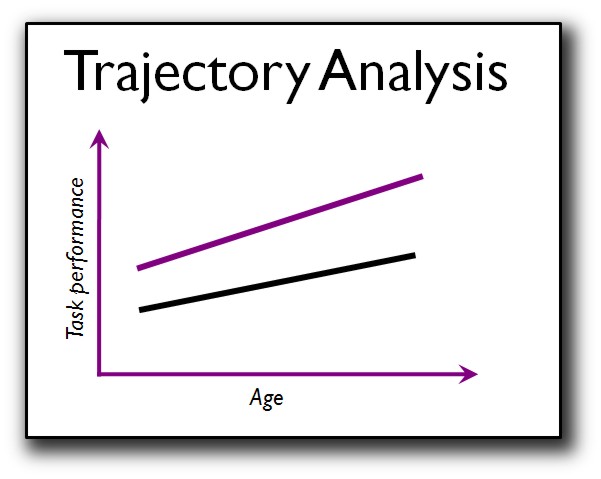 |
Thomas, M. S. C., Annaz, D., Ansari, D., Serif, G., Jarrold, C., & Karmiloff-Smith, A. (2009). |
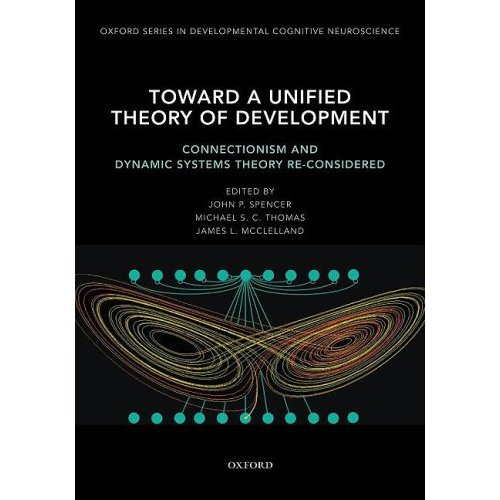 |
Spencer, J., Thomas, M. S. C., & McClelland, J. L. (2009). |
Thomas, M. S. C., McClelland, J. L., Richardson, F. M., Schapiro, A. C., & Baughman, F. (2009). Dynamical and connectionist approaches to development: Toward a future of mutually beneficial co-evolution.
In J. Spencer, M. S. C. Thomas, & J. L. McClelland (Eds). Toward a new unified theory of development: Connectionism and dynamical systems theory re-considered. Oxford: Oxford University Press. Click here for PDF version (178K).
Thomas, M.S.C. (2009). Competition as a mechanism for producing sensitive periods in connectionist models of development. In J. Mayor, N. Ruh & K. Plunkett (Eds.), Progress in Neural Processing 18: Proceedings
of the Eleventh Neural Computation and Psychology Workshop. Singapore: World Scientific. Click here for PDF version (180K).
Annaz, D., Van Herwegen, J., Thomas, M. S. C., Fishman, R., Karmiloff-Smith, A., & Runbland, G. (2009).
The comprehension of metaphor and metonymy in children with Williams syndrome.
International Journal of Language and Communication Disorders, 44(6), 962-978.
Click here for PDF version (410K)
Thomas, M. S. C. (2008). L’acquisition du langage dans les pathologies du diveloppement
[Language development in developmental disorders].
In M. Kail, M. Fayol, & M. Hickmann, L’apprentissage des langues, (pp. 451-475). Paris: CNRS Editions.
Click here for English version (107K),
click here for French version (445K)
Richardson, F. & Thomas, M. S. C. (2008). Critical periods and catastrophic interference
in self-organising feature maps.
Developmental Science, 11(3), 371-389.
Click here for PDF version (490K)
Thomas, M. S. C. & Johnson, M. H. (2008). New advances in understanding sensitive periods in brain development.
Current Directions in Psychological Science, 17(1), 1-5.
Click here for PDF version (125K)
Sirois, S., Spratling, M., Thomas, M. S. C., Westermann, G., Mareschal, D., & Johnson, M. H. (2008). Precis of Neuroconstructivism: How the Brain Constructs Cognition.
Behavioral and Brain Sciences, 31, 321-356. Target article, commentaries, and response.
Click here for PDF version (850K)
Thomas, M. S. C., Westermann, G., Mareschal, D., Johnson, M. H., Sirois, S., & Spratling, M. (2008).
Studying development in the 21st Century.
Behavioral and Brain Sciences, 31, 345-356.
Click here for PDF version (850K)
Thomas, M. S. C., & McClelland, J. L. (2008). Connectionist models of cognition. In R. Sun (Ed.),
Cambridge handbook of computational cognitive modelling (pp. 23-58). Cambridge: Cambridge University Press.
Click here for PDF version (282K)
Thomas, M. S. C. (2008). Ageing, plasticity, and cognitive reserve in connectionist networks.
In B. C. Love, K. McRae, & V. M. Sloutsky (Eds.), Proceedings of the 30th Annual Conference
of the Cognitive Science Society (pp. 2089-2094). Austin, TX: Cognitive Science Society.
Click here for PDF version (460K)
Baughman, F. D. & Thomas, M. S. C. (2008).
Specific impairments in cognitive development: A dynamical systems approach.
In B. C. Love, K. McRae, & V. M. Sloutsky (Eds.), Proceedings of the 30th Annual Conference
of the Cognitive Science Society (pp. 1819-1824). Austin, TX: Cognitive Science Society.
Click here for PDF version (1231K)
Annaz, D., Karmiloff-Smith, A. & Thomas, M. S. C. (2008). The importance of tracing developmental
trajectories for clinical child neuropsychology.
In J. Reed & J. Warner Rogers (Eds.), Child neuropsychology: Concepts, theory and practice,
(pp. 7-18). Oxford: : Wiley-Blackwell.
Click here for pdf (87k)
Westermann, G., Mareschal, D., Johnson, M. H., Sirois, S., Spratling, M. W., & Thomas, M. S. C. (2007).
Neuroconstructivism.
Developmental Science, 10:1, 75-83.
Click here for PDF version (189K)
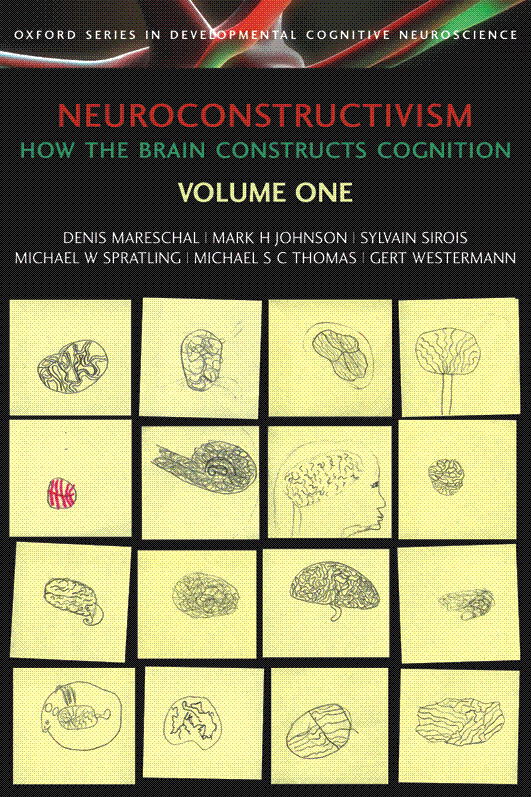 |
Mareschal, D., Johnson, M., Sirios, S., Spratling, M., Thomas, M. S. C., & Westermann, G. (2007). |
Mareschal, D. & Thomas M. S. C. (2007) Computational modeling in developmental psychology.
IEEE Transactions on Evolutionary Computation (Special Issue on Autonomous Mental Development), 11(2), 137-150.
Click here for PDF version (622K)
Mareschal, D & Thomas, MSC (2006). How computational models help explain the origins of reasoning.
IEEE Computational Intelligence Magazine. IEEE.
Click here for PDF version (404K)
Thomas, M. S. C. (2006). Williams syndrome: Fractionations all the way down? Cortex, 42, 1053-1057.
Click here for PDF version (69K)
Richardson, F.M., Baughman, F.D., Forrester, N. A., & Thomas, M.S.C. (2006). Computational Modeling of
Variability in the Balance Scale Task. Proceedings of the 7th International Conference of
Cognitive Modeling.
Click here for PDF version (131K)
Richardson, F. M., Forrester, N. A., Baughman, F. D., & Thomas, M. S. C. (2006). Computational Modeling of
Variability in the Conservation Task. In Proceedings of The 28th Annual Conference of the
Cognitive Science Society (p. 2010-2015), July 26-29, Vancouver, BC, Canada.
Click here for PDF version (191K)
Thomas, M. S. C., Forrester, N. A., & Richardson, F. M. (2006). What is modularity good for?
In Proceedings of The 28th Annual Conference of the Cognitive Science Society (p. 2240-2245),
July 26-29, Vancouver, BC, Canada.
Click here for PDF version (125K)
Thomas, M. S. C. & Johnson, M. H. (2006). The computational modelling of sensitive periods.
Developmental Psychobiology, 48(4), 337-344.
Click here for PDF version (201K)
Thomas, M. S. C., Dockrell, J. E., Messer, D., Parmigiani, C., Ansari, D., & Karmiloff-Smith, A. (2006).
Speeded naming, frequency and the development of the lexicon in Williams syndrome.
Language and Cognitive Processes, 21(6), 721-759.
Click here for PDF version of uncorrected proofs (477K)
Richardson, F., & Thomas, M. S. C. (2006). The benefits of computational modelling for the study of developmental disorders: Extending the Triesch et al. model to ADHD. Developmental Science, 9(2), 151-155. Click here for PDF version (132K)
Thomas, M. S. C. (2005). Characterising compensation. Cortex, 41(3), 434-442.
[Reprinted in: D. V. M. Bishop, M. A. Eckert & C. M. Leonard (2005) The Neurobiology of Developmental disorders. Milan, Italy: Masson.] Click here for PDF version (193K). Click here for target paper(289k)
Thomas, M. S. C., & Karmiloff-Smith, A. (2005). Can developmental disorders reveal the component parts of the human language faculty? Language Learning and Development, 1(1), 65-92. Click here for PDF version (111k)
Thomas, M. S. C. (2005). Plotting the causes of developmental disorders. Trends in Cognitive Sciences, Vol. 9, Issue 10, 465-466. Click here for PDF version (17K)
Thomas, M. S. C. (2005). Constraints on language development: Insights from developmental disorders. In P. Fletcher & J. Miller (Eds.) Language Disorders and Developmental Theory, (p. 11-34). John Benjamins.
Click here for PDF version of uncorrected proofs (no references) (166k), Click here for version with full book references (444k)
Thomas, M. S. C., & Richardson, F. (2005). Atypical representational change: Conditions for the emergence
of atypical modularity. In M. Johnson & Y. Munakata (Eds.) Attention and Performance XXI (p.315-347). Click here for B&W PDF version (264k) and here for colour versions of the diagrams (250k)
Abreu, A. M., French, R. M., Annaz, D., Thomas, M. S. C., & de Schonen, S. (2005). A visual conflict hypothesis for global-local visual deficits in Williams syndrome: Simulations and data. Proceedings of the 27th Annual Meeting of the Cognitive Science Society, Stresa, Italy, 21 July 2005. Click here for PDF version (265k)
Karmiloff-Smith, A. & Thomas, M. S. C. (2005).
Les troubles du developpement viennent-ils confirmer les arguments de la
psychologie evolutionniste? Une approche neuro-constructiviste.
Revue Francaise de Pedagogie, 152, 11-19.
Click here for (fuzzy) PDF version (4700k).
Thomas, M. S. C. & Redington, M. (2004). Modelling atypical syntax processing. In W. Sakas (Ed.), Proceedings of the First Workshop on Psycho-computational models of human language acquisition at the 20th International Conference on Computational Linguistics . Pp. 85-92. Click here for PDF version (90k)
Thomas, M. S. C. (2004). From scientific research to intervention in Williams syndrome. Williams Syndrome Foundation UK Magazine. Click here for PDF version (4465k)
Karmiloff-Smith, A., Thomas, M. S. C., Annaz, D., Humphreys, K., Ewing, S., Grice, S., Brace, N., Van Duuren, M., Pike, G., & Campbell, R. (2004). Exploring the Williams syndrome face processing debate: The importance of building developmental trajectories. Journal of Child Psychology and Psychiatry and Allied Disciplines, 45:7, 1258-1274.
Click here for PDF version (191k)
Thomas, M. S. C. (2004). The state of connectionism in 2004. Parallaxis, 8, 43-61.
Click here for html version
Karmiloff-Smith, A. & Thomas, M. S. C. (2003). What can developmental disorders tell us about the neurocomputational constraints that shape development? The case of Williams syndrome. Development and Psychopathology 15, 969-990.
Click here for PDF of final draft (122k)
Thomas, M. S. C. (2003). Limits on plasticity. Journal of Cognition and Development, 4(1), 95-121.
Click here for PDF version of uncorrected proof (114k)
Ansari, D., Donlan, C., Thomas, M. S. C., Ewing, S., Peen, T., & Karmiloff-Smith, A. (2003). How children with Williams syndrome understand why counting counts. Journal of Experimental Child Psychology, 85, 50-62.
Abstract
Thomas, M. S. C. (2002). Development as a cause in developmental disorders. Computational Intelligence, 18(1), 50-54.
Karmiloff-Smith, A., Scerif, G., & Thomas, M. S. C. (2002). Different approaches to relating genotype to phenotype in developmental disorders. Developmental Psychobiology, 40, 311-322.
Click here for PDF version of final draft (82k)
Thomas, M. S. C. (2004). How do simple connectionist networks
achieve a shift from “featural” to “correlational” processing in
categorisation? Infancy, 5(2), 199-207.
This article is accepted for publication in Infancy Journal and is
copyrighted by Lawrence Erlbaum Associates. The following PDF is for personal use
and readers must contact LEA for permission to reprint or use the material in any form.
Click here for PDF version (89k) – Supporting material for the Infancy article
(simple models and analysis)
Thomas, M. S. C. & Karmiloff-Smith, A. (2003). Modelling language acquisition in atypical phenotypes. Psychological Review, Vol. 110, No.4, 647-682.
Click here for PDF of final draft (316k)
Click here for PDF version (11,831k)
Thomas, M. S. C. (2003). Multiple causality in developmental disorders: Methodological implications from computational modelling. Developmental Science, 6 (5), 537-556.
Click here for PDF of uncorrected proofs (648k)
Thomas, M. S. C. & Karmiloff-Smith, A. (2003). Connectionist models of development, developmental disorders and individual differences. In R. J. Sternberg, J. Lautrey, & T. Lubart (Eds.), Models of Intelligence: International Perspectives, (p. 133-150). American Psychological Association. Click here for PDF version (72k)
Thomas, M. S. C. & Karmiloff-Smith, A. (2002). Are developmental disorders like cases of adult brain damage? Implications from connectionist modelling. Behavioral and Brain Sciences, 25(6), 727-788. Click here for PDF version (1162k)
Thomas, M. S. C. & Karmiloff-Smith, A. (2002). Residual Normality: Friend or Foe? Behavioural and Brain Sciences. See above for download.
Thomas, M. S. C. & Karmiloff-Smith, A. (2002). Modelling typical and atypical cognitive development. In U. Goswami (Ed.), Handbook of Childhood Development (pp. 575-599). Blackwells Publishers. Click here for PDF version (104k)
Thomas, M. S. C., Grant, J., Barham, Z., Gsodl, M., Laing, E., Lakusta, L., Tyler, L. K., Grice, S., Paterson, S. & Karmiloff-Smith, A. (2001). Past tense formation in Williams syndrome. Language and Cognitive Processes, 16 (2/3), 143-176. Click here for PDF version (530k).
Selected posters and presentations
Thomas, M. S. C. (2017). The Paradox of the Teenage Brain. “The teenage brain” conference, Ruislip High Schook, UK, Tuesday 10 October 2017. Click here for PDF of slides (12mb)
Rendell, N. R., Davelaar, E., & Thomas, M. S. C. (2017). A neural network model of bilingualism and cognitive reserve. Poster presented at the The 2017 International Convention of Psychological Science (ICPS), Vienna, Austria 23-25 March 2017. PDF.
Thomas, M. S. C. (2015). Genetics and Education. The Inaugural Annual Learnus Lecture. Church House, Dean’s Yard, London. November 18, 2015. Click here for PDF of slides (43mb). See here for a video of the talk
Fedor, A., Best, W., Masterson, J., & Thomas, M. S. C. (2013). When do behavioural interventions work and why? Towards identifying principles for clinical intervention in developmental language disorders from a neurocomputational perspective. Poster presented at 35th Annual Meeting of the Cognitive Science Society, Berlin, Germany, July 31 – August 3, 2013. Click here for PDF of poster (856k)
Thomas, M. S. C., Knowland, V. C. P., & Karmiloff-Smith, A. (2012). Modelling regression in autism. Poster presented at The 3rd UK Paediatric Neuropsychology Symposium: Early Brain-Behaviour Relationships and Prognostic Indicators, Institute of Child Health, London on 23-27 April 2012. Click here for PDF version (532k)
Forrester, G. S., Thomas, M. S. C., Annaz, D., & Mareschal, D. (2009). Limb lateralization and the evolution of communication. Poster presented at 1st Workshop on Cognition and Evolution (CogEvo), 11-13 June 2009, Rovereto, Italy. Click here for PDF version (6mb)
Thomas, M. S. C., Ronald, A., & Forrester, N. A. (2009). A simulated twin study exploring the heritability of past tense acquisition in a population of neural network models. Poster presented at Society for Research in Child Development, April 2-4 2009, Denver, USA. Click here for PDF version (950K)
Technical reports
Thomas, M. S. C., Ronald, A., & Forrester, N. A. (2009). Modelling the mechanisms underlying population variability across development: Simulating genetic and environmental effects on cognition. DNL Tech report 2009-1. Click here for PDF version (5.6mb)
Thomas, M. S. C., Richardson, F. M., Forrester, N. A., & Baughman, F. D. (2010). Modelling individual variability in cognitive development. DNL Tech report 2010-1. Thomas_etal_modellingvariability_2009.
Thomas, M. S. C., Knowland, V. C. P., & Karmiloff-Smith, A. (2011). Simulating variability in the severity of developmental disorders. DNL Tech report 2011-1. Click here for PDF version (168k)
Thomas, M. S. C., Ronald, A., & Forrester, A. (2011). Parameter definitions and specifications for population modelling
simulations of English past-tense acquisition. DNL Tech report 2011-2. Click here for PDF version (1.3mb)
Thomas, M. S. C., Purser, H. R. M., Tomlinson, S., & Mareschal, D. (2012). Synthetic brain imaging diagramming algorithm. DNL Tech report 2012-1. Click here for Excel spreadsheet file (3.7mb)
Fedor, A., Best, W., Masterson, J., & Thomas, M. S. C. (2013). Towards identifying principles for clinical intervention in developmental language disorders from a neurocomputational perspective. DNL Tech report 2013-1. Click here for PDF version (785k)
Karaminis, T. N., & Thomas, M. S. C. (2014). The Multiple Inflection Generator: A generalized connectionist model for cross-linguistic morphological development. DNL Tech report 2014-1. Click here for PDF version
Filippi, R., Richardson, F., Morris, J., Marian, V., Thomas, M. S. C., & Karmiloff-Smith, A. (2015). Shush, the teacher is speaking! A bilingual advantage in comprehending speech in noisy environments. DNL Tech report 2015-1. Click here for PDF version (2.2mb)
Copyright Notice: The documents distributed here have been provided as a means to ensure timely dissemination of scholarly and technical work on a noncommercial basis. Copyright and all rights therein are maintained by the authors or by other copyright holders, notwithstanding that they have offered their works here electronically. It is understood that all persons copying this information will adhere to the terms and constraints invoked by each author’s copyright. These works may not be re-posted without the explicit permission of the copyright holder. (Thanks to Dave Plaut, from whom this notice is borrowed).